
30 Political Leaders of India Leading From The Front
Great political figures have come from India, where they have governed successfully while also upholding the interests of the nation. Since it gained independence on August 15, 1947, one of the largest democracies in the world has seen the emergence of 200 political parties.
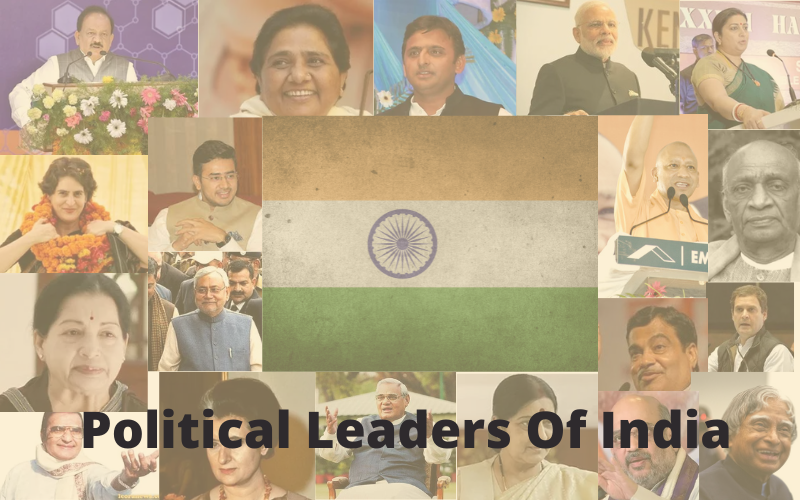
Considering the changes in the international political environment, it was not a simple assignment to complete. In comparison to other democracies, India has a lot of political parties, some of which are centered on its leaders.
Here is a comprehensive list 0f 30 political leaders of India that highlight their accomplishments and political biographies.
1. Tejasvi Surya
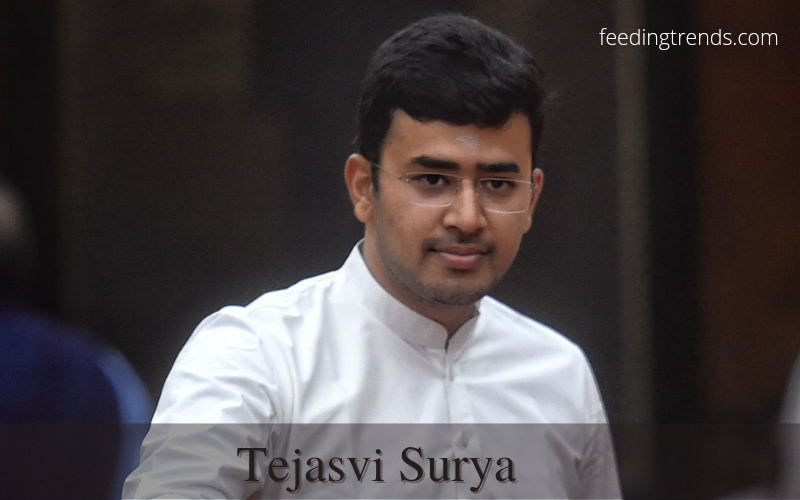
Tejaswi Surya, an Indian lawyer who was one of the BJP's youngest candidates in the 2019 Lok Sabha election, was born on November 16, 1990. He was one of the hundreds of people in the BJP's vast social media team before entering the race. There is already a record of Tejaswi Surya's eight years of public service. At the young age of 12, Tejaswi won the "Rastreeya Balashri" award and was a prominent participant in the Akhila Bharata Vidhyarthi Parishad. He is amongst the youngest political leaders of India who is in politics.
"I’ve always wanted to do something for India by working in the fields of politics, culture, history, and administration. The fact that I get to travel across the state motivating and inspiring people is what pushed me to channelize all my energy towards making a difference, showing people that there’s a great possibility about India," said Tejasvi Surya.
2. Atal Bihari Vajpayee
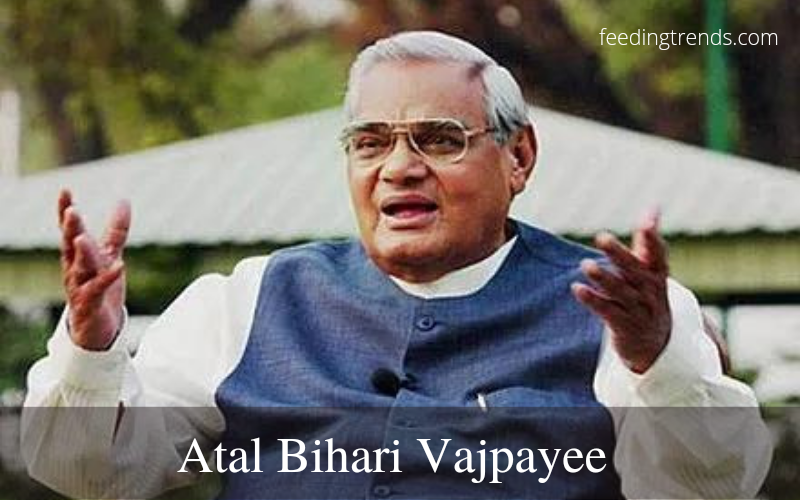
Atal Bihari Vajpayee was born on 1924 December 25, in Gwalior, Madhya Pradesh. He was an Indian politician, poet, and statesman who was elected three times as Prime Minister. Vajpayee was an active member of the Rashtriya Swayamsevak Sangh RSS and a founding member of the Bharatiya Janata Sangh.
He served in both the Lok Sabha and the Rajya Sabha, representing Lucknow in the lower house from 1991 to 2009. He was known for his powerful public speaking abilities. Vajpayee was one of those political leaders of India who were imprisoned during the 1975 emergency declared by then-prime minister Indira Gandhi.
Vajpayee was the first BJP member to ever hold the position of prime minister and served as the leader of the National Democratic Alliance NDA government from 1998 to 2004.
India conducted its second nuclear test in Rajasthan in 1998 and the Kargil war in 1999 during his administration. He is one of those political leaders of India who had given their life for the betterment of our nation
He received Bharat Ratna in 2015, the nation's highest civil honor. He died on August 16, 2018, at the AIIMS in Delhi, as a result of a protracted illness.
3. Yogi Adityanath
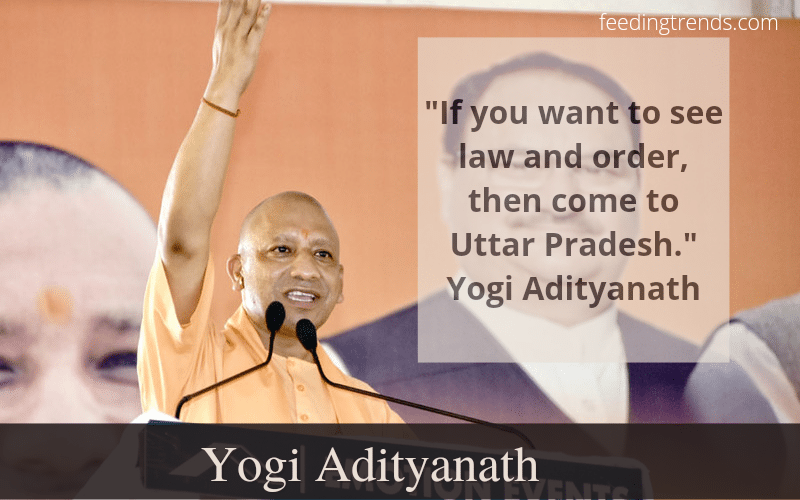
Yogi Adityanath aka Ajay Singh Bisht. The day he was born was 5 June 1972. Around 1990, he joined the Ayodhya Ram temple movement and became a devotee of Gorakhnath Math's top priest, Mahant Avaidyanath. He thereafter adopted the name "Yogi Adityanath" and succeeded Mahant Avaidyanath. Yogi Adityanath was chosen as Mahant Avaidyanath's successor and appointed to the position of head priest at the Gorakhnath Math around 1994.
During the 12th Lok Sabha in 1998, he was the youngest member elected. Following that, the BJP won the assembly elections, and he was elected chief minister of Uttar Pradesh in 2017.
When he came to power, he prohibited the use of cigarettes, pan, gutka, and cows in the state of Uttar Pradesh. In the state, he also established anti-romeo squads. As well, more than 100 police officers were suspended. Yogi Adityanath is a diligent worker with a strong commitment to his work.
4. Rahul Gandhi
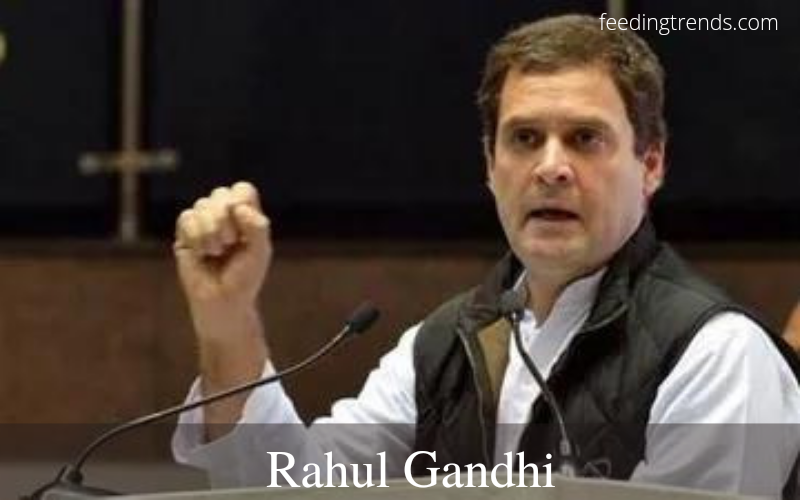
Rahul Gandhi, is one of the political leaders of India who represents Wayanad, Kerala, in the 17th Lok Sabha, was born on June 19, 1970. He is a member of the Indian National Congress and served over that organization from 16 December 2017 to 3 July 2019. Gandhi serves as the National Students Union of India and the president of the Indian Youth Congress.
Rahul Gandhi is the first of two children born to Rajiv Gandhi, who subsequently became Prime Minister of India, and Sonia Gandhi, an Italian-born woman who later became President of the Indian National Congress, as well as the grandson of the then Prime Minister Indira Gandhi.
5. Arvind Kejriwal
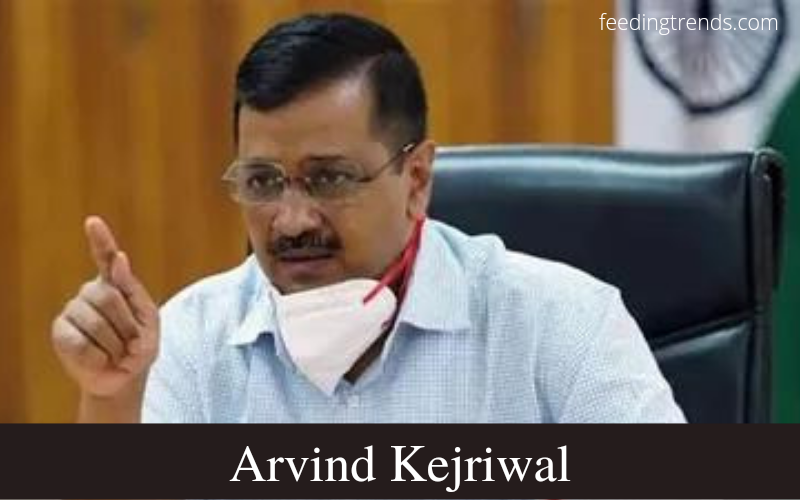
Arvind Kejriwal, born on August 16, 1968, is the seventh Chief Minister of Delhi. He is a politician and an activist who became well-known after the passing of the Jan Lokpal Bill with activist Anna Hazare. He belongs to the political leaders of India who first were the activist.
Before entering politics, he worked for Tata Steel and served as a joint commissioner of the Income Tax Department in New Delhi after passing his civil service test.
He served as Delhi's chief executive from December 2013 to 2014. He was re-elected as Delhi's chief minister for the second time in February 2015, with a massive majority.He was elected as national convener of the Aam Aadmi Party for the third time in September 2021.
In 2006, Kejriwal received the Ramon Magsaysay Award for Emergent Leadership in appreciation of his engagement in the grassroots movement Parivartan, which used right-to-information legislation in a battle against corruption.
6. Rajnath Singh
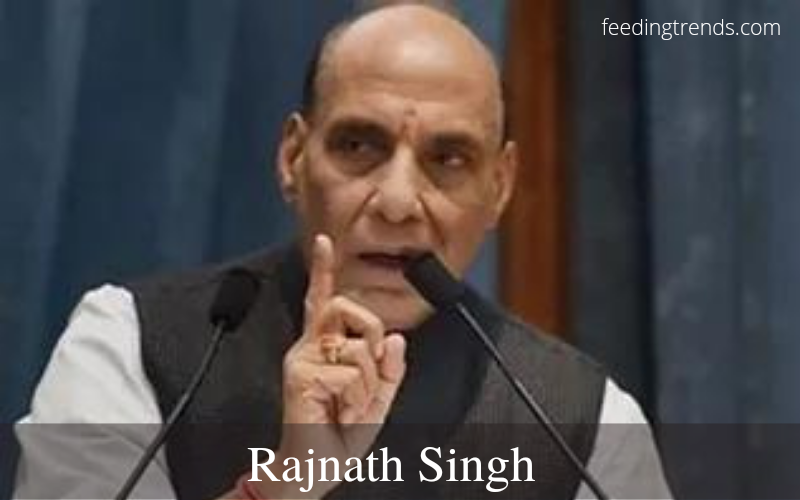
Rajnath Singh was born on July 10, 1951, into a farming family in the UP village of Babhora, which is part of the Chandauli district. He joined RSS at the age of thirteen. He was a physics lecturer before entering politics. He played a crucial role in twice saving the BJP-led government during the political crisis of 1997.
Atal Bihari Vajpayee's dream project, the national highway development program, was started in 1999 by the union surface transport minister.
In his capacity as union agriculture minister, he started a couple of Nobel initiatives.
And on September 19, 2019, he flew aboard a Tejas fighter jet for the first time as India's defense minister.
"Our scientists have the capability to develop low-cost indigenous technologies which could be a model in the world of space exploration."
Shri Rajnath Singh
7. Narendra Modi
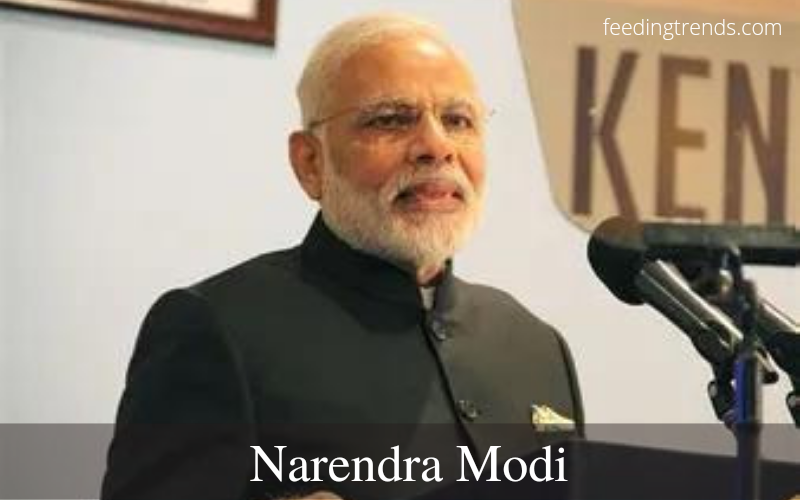
Narendra Modi is India's 14th Prime Minister. He began his career as a tiny child selling tea with his father in Vadnagar, Mehsana, Gujarat. His passion for assisting others dates back to his early years. This led him to join the Bharatiya Janta Party in 1987. Soon after, he was elected as the general secretary of the Gujarat branch of the BJP. He quickly rose to become Gujarat's chief minister in 2001 with a clear conscience and some forceful statements. He served as Gujarat's public face without losing for three consecutive terms before being elected in 2014. Each village in Gujarat now has electricity thanks to the efforts of this outstanding politician. He aims to be able to offer the same to the entire country. He has been a keen devotee of Swami Vivekananda's teachings. He is one of those political leaders who are effectively doing something for geopolitical situations.
He has a reputation for being cordial with our neighbors. In western nations, he is very powerful. For many Indians who look up to him, Narendra Modi represents a glimmer of optimism.
In Forbes World's Most Powerful People list 2018 he ranked 9th.
On April 4, 2019, Indian Prime Minister Narendra Modi received the Zayed Medal, the highest honor bestowed upon kings, presidents, and heads of states, from UAE President Sheikh Khalifa bin Al Nahyan. He was given the honor in recognition of his efforts to keep UAE strategic ties strong.
PM Narendra Modi, a biographical movie starring Vivek Oberoi, was released in January 2019.
"My struggle is to bring life in file." - Narendra Modi
8. Amit Shah
Amitbhai Amit Shah, whose full name is Anil Chandra Shah, was born in 1964 in Mumbai and attended school in his ancestral village of Maansa, Gujarat. She worked as a stockbroker and for Ahmedabad's cooperative banks. He was motivated and influenced by the RSS's nationalist ethos, joining it actively. The founder of the student section of the RSS, Akhil Bhartiya Vidyarthi Parishad,
He joined the BJP in 1984, rose through the ranks to become its president in 2014, and was responsible for Narendra Modi's resounding victory in the general elections.
Despite his busy schedule and numerous public appearances, Amit Bhai enjoys relaxing with classical music, chess, and watching a game of football.
9. Mamata Banerjee
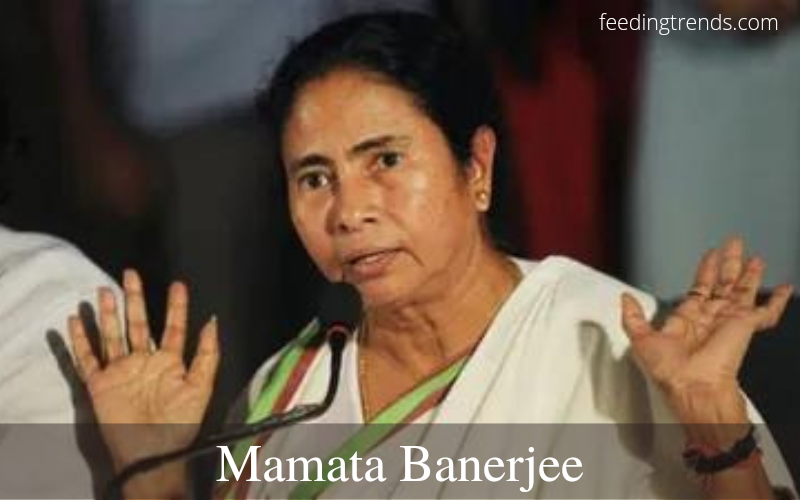
Mamta Banerjee, also known as didi, was born on January 5, 1955, in Calcutta, West Bengal, and is one of the Indian politicians who was elected chief minister for the third time. She is a member of the Trinamool Congress in India. She has remained unadorned in public throughout her political career. She always wears Hawai'i Chappals with a traditional white saree.
When she was just 15 years old, the Indian National Congress was where she began her political career. She paints and writes poetry as well. In October 2012, a gala event in New York City featured an auction of one of her paintings, "Flower Power."
Bill Gates thanked Mamata and her team in a letter to the West Bengal government in February 2012 for a year without any confirmed cases of polio in the region.
She is one of those political leaders of India who are known for their fearless and straightforward attitude.
10. Nitin Gadkari
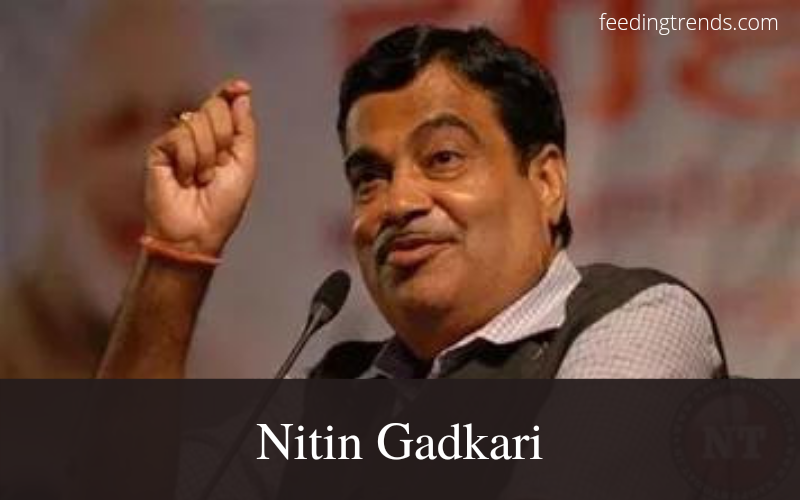
Nitin Gadkari was born on May 27, 1957, in Nagpur, India, to a Maharashtrian family with agricultural roots. Gadkari's mother had a profound impact on him.
He absorbed and always put into practice his mother's charitable and compassionate personality, assisting those in need even if it depleted their meager means.
In many ways, Gadkari's life was changed by the Emergency. During those times, he started taking an active role in politics, and the march is still on now. In addition to studying law and earning a diploma in business management, Gadkari finished his post-graduate degree in commerce while participating in student politics.
He vigorously advocated against the 1975 National Emergency that had been declared by Prime Minister Indira Gandhi while he was still a student.
He actively advocated against the 1975 National Emergency that had been declared by Prime Minister Indira Gandhi while he was still a student. Gadkari became heavily active in social work and formed close ties with the Akhil Bharatiya Vidyarthi Parishad (ABVP) and Rashtriya Swayam Sevak Sangh (RSS). His inspiration came primarily from the nation-building and humanitarian principles of RSS founder K. B. Hedgewar. Gadkari comes under those political leader of India who are doing things for the place where they belong to.
11. Sharad Pawar
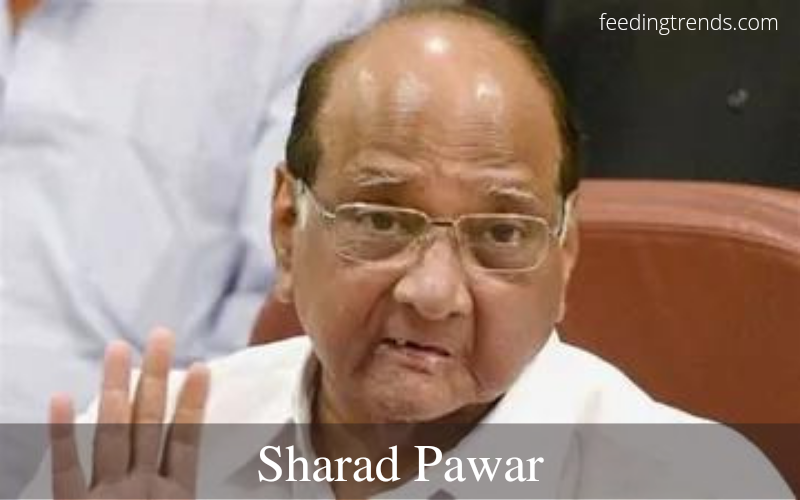
Sharadchandra Govindrao Pawar, widely known as Sharad Pawar is the President of the International Cricket Council and the Nationalist Congress Party He was born on 12th December 1940 in Baramati which is in Pune, Maharashtra. He completed his graduation in commerce. In 1967, Pawar entered the Maharashtra Legislative Assembly from Baramati as the representative of the Congress Party. He resigned from the Congress Party in 1978 to work with the opposition to establish the government. As a result, he was appointed as Maharashtra's first Chief Minister. At the time, Indira Gandhi was despised for insinuating that the nation was in a state of emergency. In 1993 he was one of those Indian political leaders who was elected for the fourth time as the Chief Minister of Maharashtra.
During seven years as the Chief Minister of Maharashtra, Sharad Pawar turned the state into a leading industrial center in the country. In 2005 he Became the President of BCCI later on after 5 years he became the president of ICC.
12. Vilasrao Deshmukh
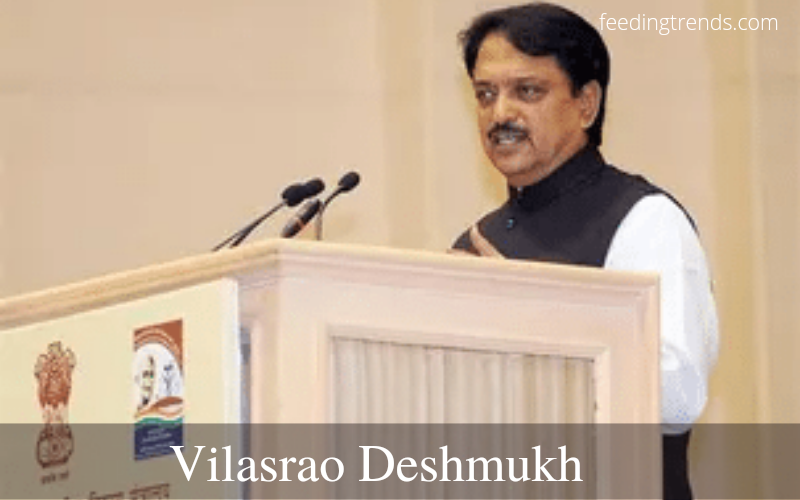
Vilasrao Dagadojirao Deshmukh was born on May 26, 1945, in Babhalgoan, Latur, Maharashtra, India. He was the father of Ritesh Deshmukh. Vilasrao Deshmukh was a renowned Indian lawyer and political leader of India who served twice as Maharashtra's Chief Minister, from 1999 to 2003 and 2004 to 2008. Among his many roles, he was Minister of Science and Technology and Minister of Earth Sciences. And he was a member of the Rajya Sabha.
The Deshmukh's Manjra Charitable Trust runs several colleges in Mumbai and Latur. Among them are Manajara Ayurvedic Medical College & Hospital Latur, Abhinav College Latur, and VDF Polytechnique.
As well as establishing two engineering colleges, he founded the Marathwada Mitramandal Foundation. Similarly, there is one at the Marathwada Mitra Mandal's Institute of Technology in Lohegaon, Pune.
He was 67 years old when he passed away in Chennai, the reason for his death was liver disease.
13. Nitish Kumar
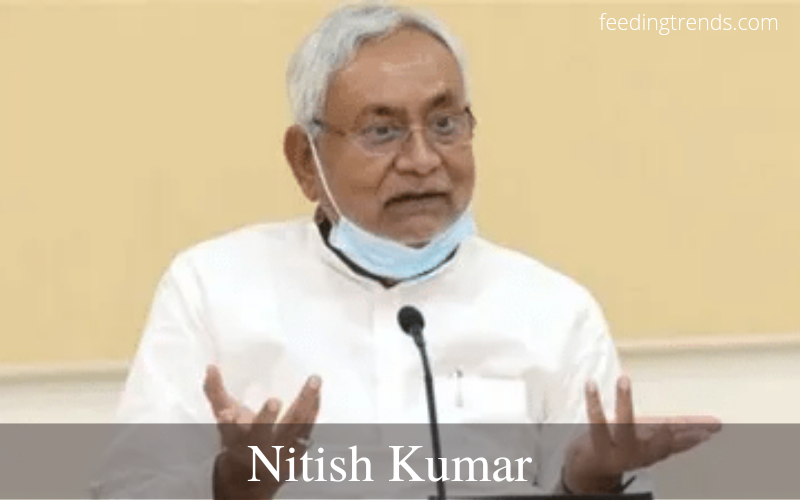
Nitish Kumar (born 1 March 1951) is a political veteran with a prestigious resume to support his time in the field, has held the position of chief minister of Bihar for five terms. He has also had a ministerial position in the Indian Union Government. Additionally, he held the office of Barh's MP six times.
Nitish Kumar appealed to the public's discontent with the state's performance under the previous administration. He entered Bihar's turbulent political scene and devised workable measures to stabilize the province's sputtering economy. In the early years of his ministerial tenure, he appointed more than 100,000 school teachers, made sure that doctors worked in primary health centers, developed infrastructure, reduced female illiteracy by half, turned around a lawless state by cracking down on criminals, and increased the income of the poor by doubling the average Bihari.
14. Smriti Irani
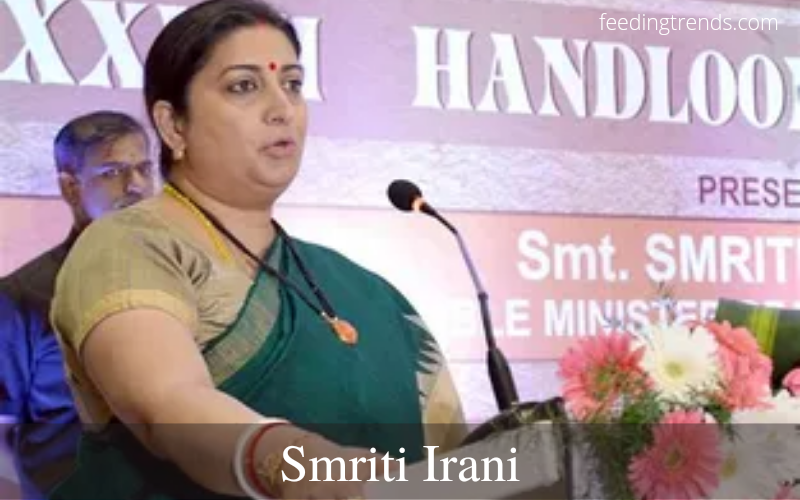
Smruti Zubin Irani is a politician from India, as well as a former model, producer, and television actor. In India's Union Cabinet, she serves as a minister. She is one of those political leaders of India who belongs to tv industry. She began her modeling career and placed in the top three of Miss Fermina India in 1997. Smriti Irani was a waitress at McDonald's during her tough times. She appeared in a few Hindi soap operas.
She soon left the television industry to become the Minister of Human Resource Development for the Government of India. She soon quit the TV business after being chosen to serve as India's minister of human resource development. She was elected as a Cabinet Minister on May 30, 2019, in the second Modi Ministry. She is now the youngest Minister in the Council of Ministers at the age of 43.
She was elected to the Task Force responsible for the first-ever committee of young parliamentarians in the Inter-parliamentary Union, representing the Asia Pacific region.
She was named one of Femina's "Women Who Changed the Game" in 2019 for her victory over Amethi.
15. Umma Bharti
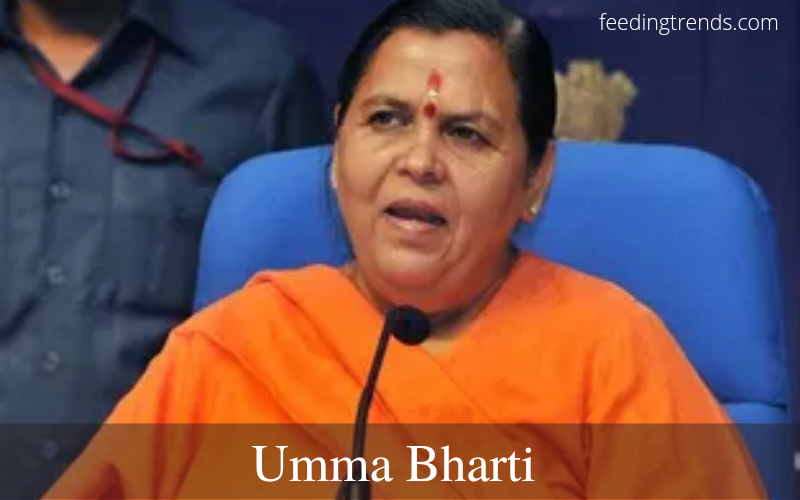
Uma Bharti was born on May 3, 1959, in Tikamgarh, Madhya Pradesh, to a pious Lodhi family of peasants. She completed the sixth standard of education. Uma Bharti is well-known for her strict religious convictions and is dubbed as the'sanyasin' politician. She ran in her first Lok Sabha election at age 25. Additionally, in 2004 she was expelled from the BJP as a result of a confrontation with L.K. Advani, a prominent member of the party.
She was an important figure in the Ayodhya Ram Janmabhoomi Movement. She is the Union Minister for Water Resources and Ganga Rejuvenation at the moment. Bharti was re-inducted into the BJP on June 7, 2011. Before the state's 2012 assembly election, she was entrusted with revitalizing the party there. She was appointed Minister of Sanitation and Drinking Water on September 3, 2017.
16. Sushma Swaraj
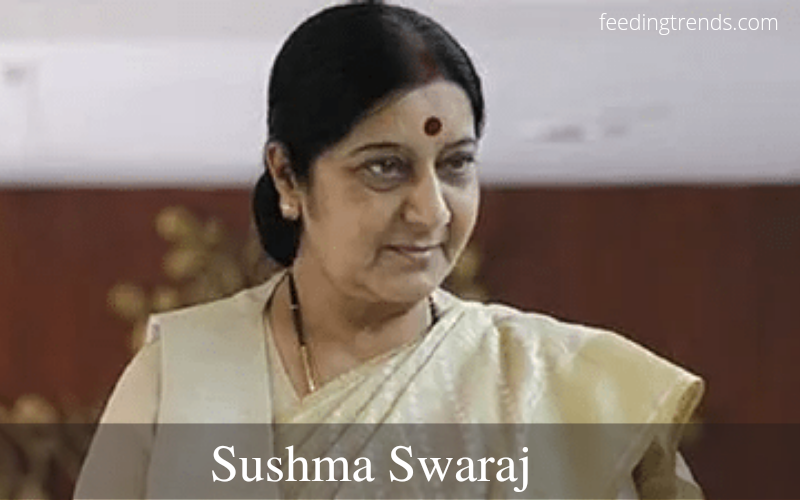
Sushma Swaraj was born at Ambala Cantonment Punjab, India, on February 14, 1952. She began her political career in the 1970s with Akhil Bharatiya Vidyarthi Parishad. By profession, she was an advocate. Swaraj began her law career in the Supreme Court of India in 1973. Sushma began her political career as a student leader in the early 1970s. She served as Delhi's first female chief minister from October 13 until December 3, 1998. She was named Haryana's Best Speaker three years in a row. Sushma Swaraj won the title of "Best Parliamentarian" twice, in 2008 and 2010. She is the first and only female member of parliament to earn the Outstanding Parliamentarian award.
Swaraj Kaushal became the country's youngest Governor in 1990.
She served as the most renowned Minister of External Affairs for India. Sushma Swaraj died on August 6, 2019, at the AIIMS in New Delhi.
17. S. Jaishankar
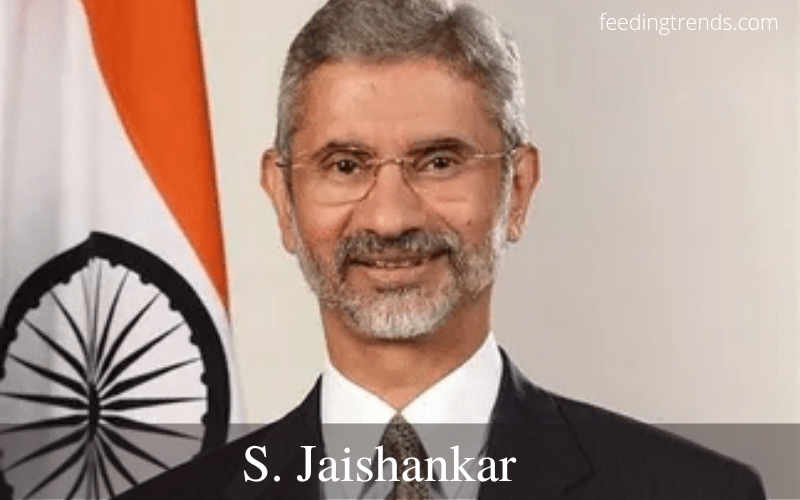
Subramanyam Jaishankar was born on January 9th, 1955 in Delhi. He studied at the Air Force Central School in New Delhi and went on to the JNU to pursue a nuclear diplomacy specialization.
Jayshankar holds a political degree and is now India's 30th External Affairs Minister. Previously, he worked as President of Global Corporate Affairs at Tata Sums Private Limited, as well as Foreign Secretary and Ambassador to China, Singapore, and the Czech Republic.
In 2019, the Narendra Modi administration awarded him the Padmashree. Jai Shankar is the only member of Narendra Modi's cabinet who was appointed without running for Lok sabha office or being a Rajya Sabha member.
He also promoted India as an independent and powerful state in the modern geopolitical context at many conferences.
Once in Raisina Dialogue, he stated, ‘It is better to engage with the world as who we are rather than how we are perceived'
18. Y. S. Jaganmohan Reddy
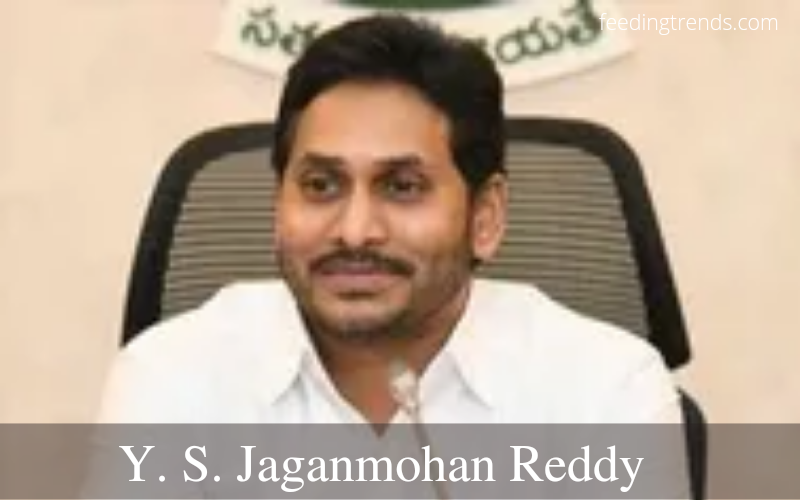
On December 21, 1972, Yeduguri Sandinti Jaganmohan Reddy was born in the Andhra Pradesh village of Pulivendula in the Kadapa District. He is the son of Y. S. Rajasekhara Reddy, who was a chief minister of Andhra Pradesh.His education was completed in Hyderabad Public School. He received his diploma from Nizam College. His academic credentials include a B.com and a Master of Business Administration (M.B.A).By winning 151 of the 175 Assembly seats in the 2019 elections, he led his party to an astonishing victory.
He was appointed as Andhra Pradesh's second chief minister following its split on May 30th, 2019.
Following the passing of his father, he started the odarpu yatra.
He promised to meet everyone who had died by suicide or had a serious illness. Inaugurating the PrajaSankalpaYatra on November 6th, 2017, Y.S. Jagan Mohan Reddy is a 3,000-kilometre-long walkathon.
19. Lal Bahadur Shastri
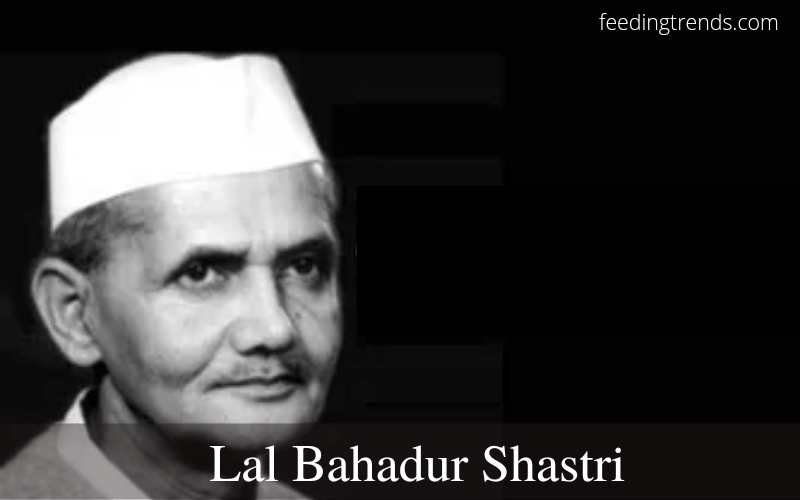
Shri Lal Bahadur Shastri was born on October 2, 1904, in Mughalsarai, a tiny railway town in Uttar Pradesh that is located seven miles from Varanasi. From 9 June 1964 to 11 January 1966, he served as India's second prime minister. He also held important roles as the Home Minister, Minister of External Affairs, and Minister of Railways.
Lal Bahadur Shastri was a renowned independence warrior who, from a young age, was inspired by figures like Mahatma Gandhi, Annie Besant, and Swami Vivekananda. With just a few months until his high school finals, he abruptly left Harish Chandra College to join the anti-cooperation campaign.
In 1940, Shastriji was put behind bars once more for his involvement in the Satyagraha movement. He was the most genuine and sincere politician to ever lead the country. Because of his uncomplicated ways, he was not only well-liked in the halls of power but was readily endeared to the populace. He is renowned for his participation in the 1965 Indo-Pakistan conflict and for creating the catchphrase "Jai Jawan Jai Kisan."
Lal Bahadur Shastri, the then-prime minister of India, passed away in Tashkent, Soviet Union, on January 11, 1966, under unexplained circumstances. This was not your average passing away. It was a fatal accident whose cause is still a mystery.
20. Arun Jaitley
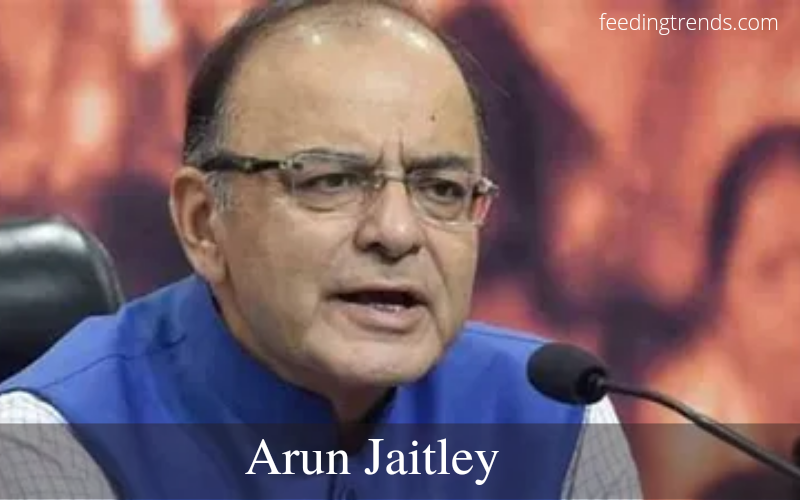
On December 28, 1952, in New Delhi, Shri Arun Jaitley was born. He is an attorney, politician, and government employee who presided as the BJP's leader in the Rajya Sabha from 2008 to 2014.
Speaking with grace and authority, Jaitley had a relatively uncontroversial political and professional career. He was first hired as an additional solicitor general for the government in 1989–1990. He was accepted into the BJP in 1991. Despite being a party activist since 1980, he has never run in a general election. He ran in his first direct election from Amritsar in 2014, but INC candidate Amarinder Singh defeated him.
Jaitley served as the BCCI's vice president, but he and the other vice presidents resigned as a result of the IPL spot-fixing incident. At the 2019 Economic Times Awards, the Lifetime Achievement for Public Service honor was given to him posthumously. He died on August 24 at the age of 66 from health issues in AIIMS New Delhi.
21. J. Jayalalithaa
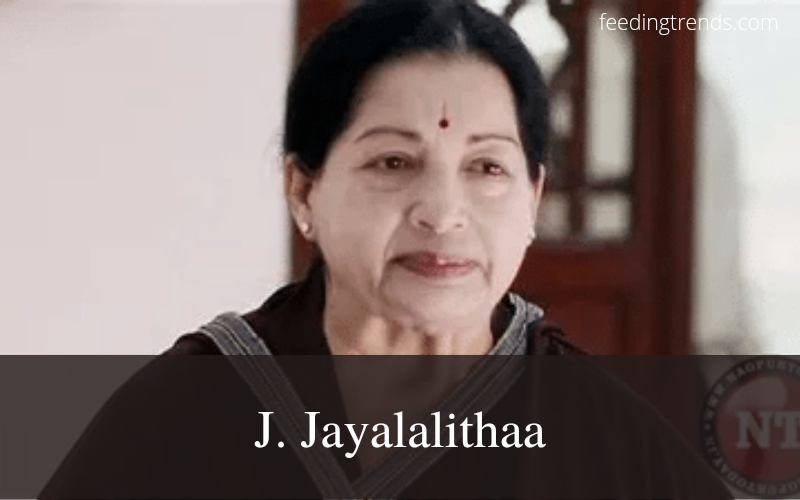
Jayaram Jayalalithaa was born on February 24, 1948. She was an Indian politician and actress who presided over Tamil Nadu six times for more than 14 years, from 1991 to 2016. She served as the general secretary of the Dravidian party All India Anna Dravida Munnetra Kazhagam (AIADMK) beginning on February 9 of that year. Her followers saw her as their "Amma" (mother) and Puratchi Thalaivi (revolutionary leader).
Her critics in the media and the opposition accused her of encouraging a personality cult and of expecting unwavering allegiance from AIADMK legislators and ministers, who frequently publicly bowed down to her.
Despite her reluctance to enter the field, Jayalalithaa worked a lot after her mother encouraged her to do so to support the family.
She passed away on December 5, 2016, in Chennai, Tamil Nadu, at the age of 68 from cardiac arrest.
22. Sardar Vallabhbhai Patel
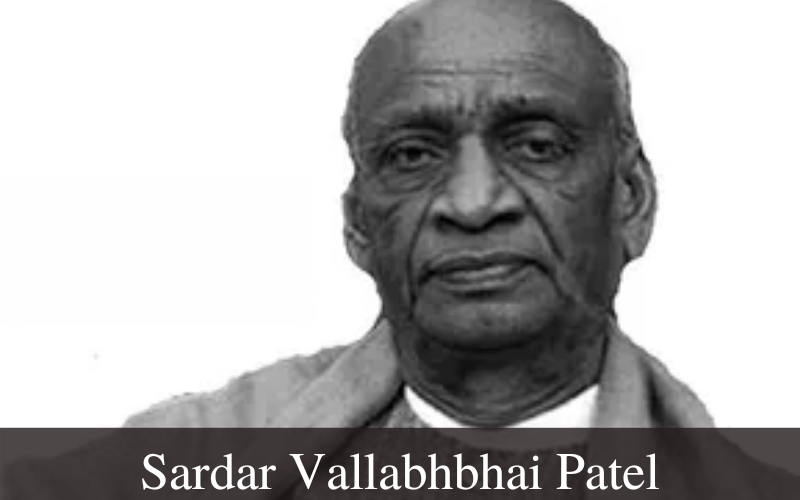
The "Iron Man of India," Vallabhbhai Patel, was born on October 31, 1875, in Gujarat.
He was an Indian lawyer who served as India's first deputy prime minister. He was also a prominent member of the Indian National Congress and played a crucial part in the country's war for independence and helped to lead its merger into a single, independent country.
In India and other countries, he was frequently referred to as Sardar, which is Hindi, Urdu, and Persian for "chief".
He served as Home Minister during the 1947 Indo-Pakistani War and India's political unification.
Patel grew up in a rural area of the Gujarati state after being born in the Nadiad District of Kheda.
Sardar Vallabhbhai Patel received the Bharat Ratna, India's highest civilian honor, posthumously in 1991. On October 31, which is also his birthday, Sardar Jayanti is observed. The Indian government constructed a 182 m (597 ft) tall statue of Sardar Patel to recognize his crucial role in uniting 562 princely republics and integrating India after independence. On the river island known as Sadhu Bet near Vadodara in Gujarat, it will be the highest statue in the world and constructed facing the Narmada Dam, which is 3.2 kilometers distant.
23. N.T.Rama Rao
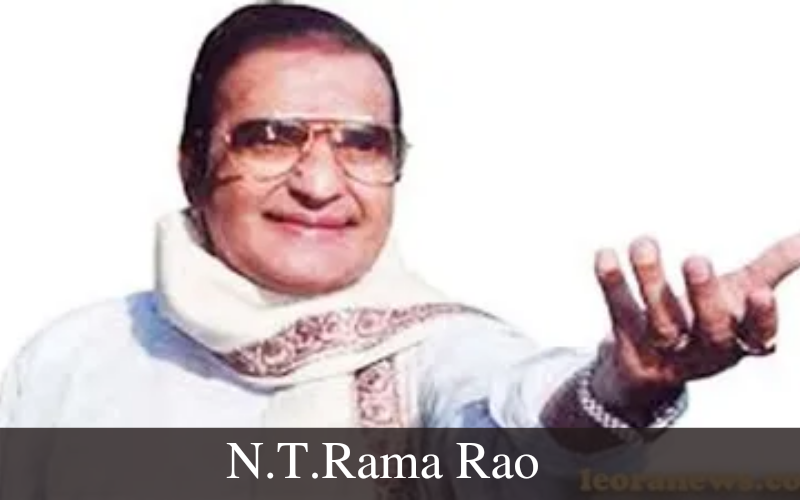
The actor, director, producer, and politician Nandamuri Taraka Rama Rao, popularly known as NTR, was born on May 28, 1923, in Nimmakuru, Krishna District, Andhra Pradesh. NTR had to supply milk to hotels to augment his family's income while he was a student in Vijayawada in the early 1940s.
He founded the Telugu Desam party and served as the position of Chief Minister of Andhra Pradesh. Rao became a political activist and a party leader after his success in film.
He is renowned for supporting Andhra Pradesh's unique cultural identity and separating it from Madras State, to which it was frequently compared.
N.T. Rama Rao passed away from a heart attack on January 18, 1996. He received the fourth-highest civilian honor, the Padma Shri, in 1968 in recognition of his contribution to Indian cinema.
24. Indira Gandhi
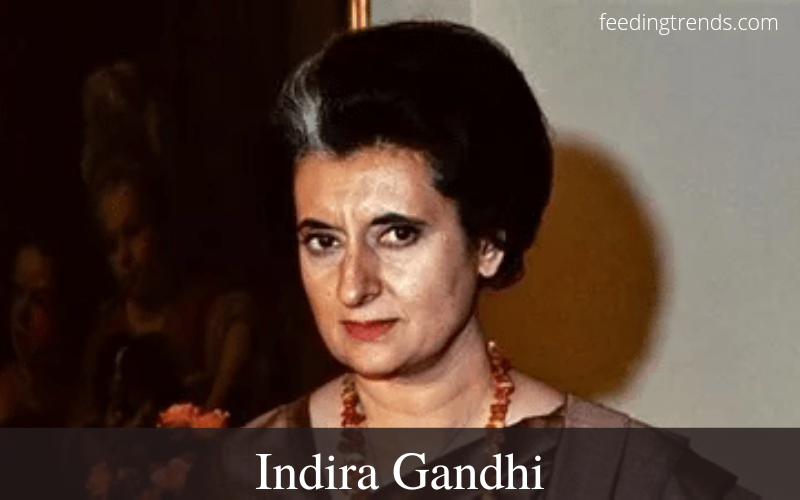
Indira Priyadarshini Gandhi, who was born on November 19, 1917, was a prominent member of the Indian National Congress. She served as India's first and only female prime minister up until this point. Jawaharlal Nehru, the country's first prime minister, was the father of Indira Gandhi.
She was assassinated in October 1984 for no other reason than THE OPERATION BLUESTAR, making her the second longest-serving Indian prime minister behind her father. She held office from January 1966 to March 1977 and again from January 1980 till her death. Gandhi was regarded as a crucial aide and traveled with Nehru on many of his international tours while he served as prime minister of India from 1947 to 1964. In 1959, she won the election for Indian National Congress President.
25. Sunil Dutt
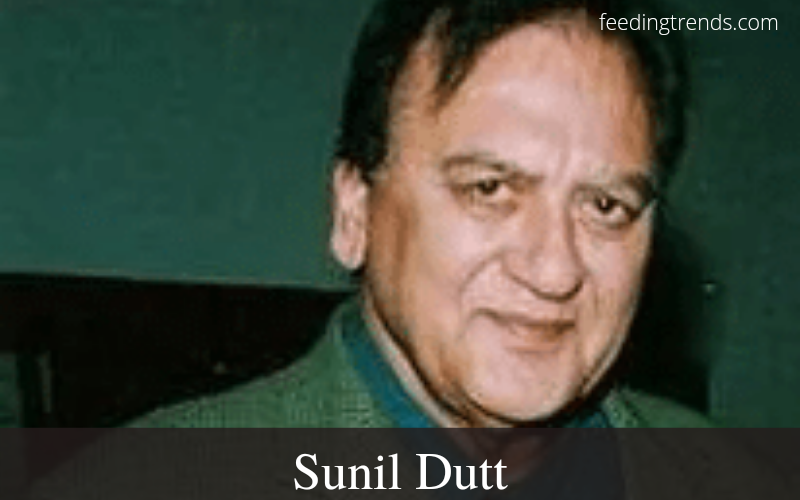
Balraj Dutt, aka Sunil Dutt, was born on June 6, 1930, in kurud village, Punjab (British province). He was an actor, producer, director, and politician.
Dutt was one of the political leaders of india who witnessed rioting between Hindus and Muslims during the partition. He married former actor Nargis. He established the Nargis Foundation to help cancer patients find a cure in honor of his devoted wife. And additionally supported the India project (an organization that works to help children with facial deformities) Took part in the National Congress in 1984, and from Mumbai, was elected to the Lok Sabha. At home in Mumbai, he passed away on May 25, 2005, after a heart attack.
His daughter contested for his seat in the legislature after his passing and won. He received the government's highest honor, the Padma Shri.
26. Chirag Paswan
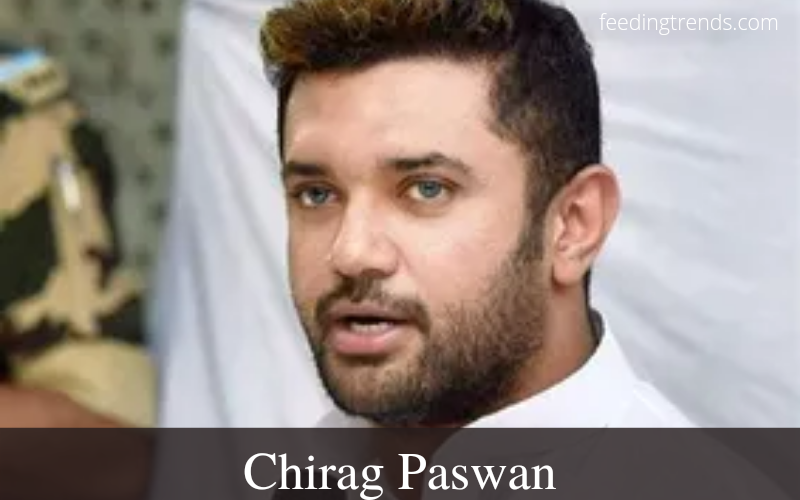
Chirag Paswan was born in Khagaria on October 31, 1982. He is the son of the late union minister and parliamentarian Ram Vilas Paswan. He graduated from the Institute of Engineering and Technology, Janshi, Bundelkhand University, Janshi, with a B.Tech (Computer Engineering) in the third semester in 2005.
Before entering politics, he made his acting debut in Bollywood, but that was the wrong move for him.
He currently serves as LJP Jamui's MP. He was elected to the 16th Lok Sabha in 2014, and in 2019 he once again won the MP elections for that position. He had a significant role in the LJP and BJP's 2014 alliance creation, and his actions demonstrated the success of his choice. His non-profit organization, the Chirag Paswan Foundation, seeks to give underprivileged children access to education and jobs for Bihar's unemployed youth.
27. Harsh Vardhan
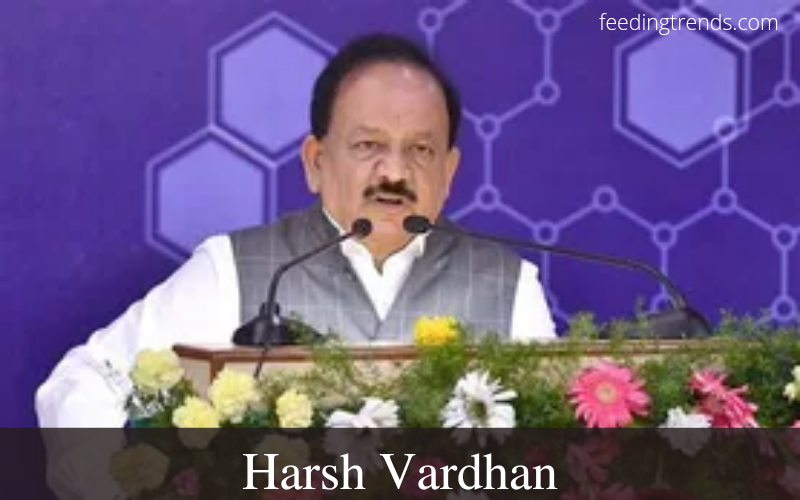
Harsh Vardhan was born in New Delhi, India, on December 13, 1954. He will be 65 years old in 2020.
Ganesh Shankar Vidyarthi Memorial (G.S.V.M.) Medical College Kanpur, U.P., where he studied MS (Ent).
He is a politician, otolaryngologist, surgeon, physician, and author from India.
Dr. Harsh Vardhan Goel is Harsh Vardhan's full name.
He was an early Rashtriya Swayamsevak Sangh (RSS) activist before entering politics, which subsequently led to his increased involvement.
He represented Delhi's Chandini Chowk constituency in the House of Representatives.
On May 26, 2014, he was also appointed Minister of State in the inaugural Narendra Modi administration.
He was chosen to lead the World Health Organization's Executive Board beginning on May 22, 2020. Vardhan has played a significant role in the response of the Indian government to the COVID-19 outbreak. He later left his position in the cabinet before the July 2021 cabinet reshuffle. The Indian Medical Association presented the IMA President's Special Award of Appreciation in 1994 to him.
28. Mayawati
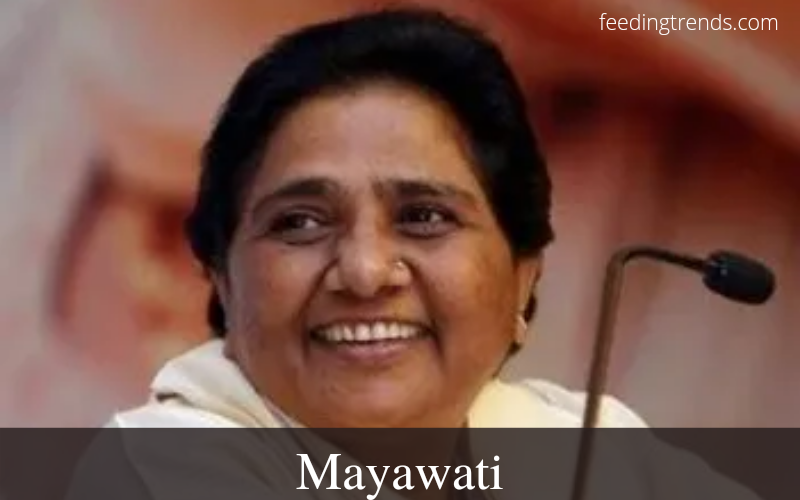
Indian politician Mayawati was born on January 15, 1956. Mayawati, one of the most illustrious politicians this nation has ever produced, made history when she became the first Dalit woman to hold the office of Uttar Pradesh Chief Minister. She held the position of Chief Minister for four terms before retiring in 2012 as a result of a crushing defeat in the assembly elections. She leads BSP on a national level. Her entry into politics began when BSP founder Kashi Ram met her; she was formerly a teacher. He wooed her into politics before handing over control to Mayawati in 1995. From the Bijnor constituency, she won her first Lok Sabha election in 1989. In 1994, she won a seat in the Rajya Sabha. From 1998 to 2004, she represented the Akbarpur constituency in the Lok Sabha for an additional three terms. Recent events, meanwhile, suggest that she is slowly but surely pulling herself out of the political grave. Perhaps there is a turning of the tides as seen by her partnership with SP and her victory in Aligarh and Meerut for mayor.
29. Akhilesh Yadav
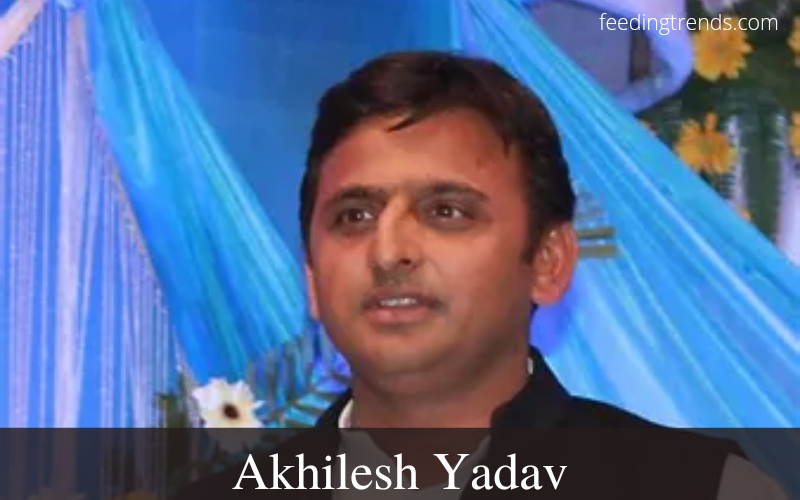
Akhilesh Yadav, the son of former prime minister Mulayam Singh Yadav, was born on July 1st, 1973.
He is a Samajwadi Party politician who is active. He is Uttar Pradesh's 20th chief minister. He received his education from Etawah's St. Mary's School. In Dholpur, Rajasthan, he then enrolled at the Dholpur Military School. At Sri Jayachamarajendra College of Engineering in Mysore, he earned a bachelor's degree in civil and environmental engineering. He afterward traveled to Australia to attend the University of Sydney to complete a master's degree in environmental engineering.
Akhilesh Yadav, the leader of the Samajwadi Party, had a successful electoral campaign in 2012 against BSP chief Mayawati. He is the leader of the Samajwadi Party and had a successful electoral campaign in 2012 against BSP chief Mayawati. He was sworn in as Uttar Pradesh's youngest chief minister in March 2012 at the age of 38. After his party was trounced by the BJP on March 11, 2017, he announced his resignation as CM.
30. Priyanka Gandhi
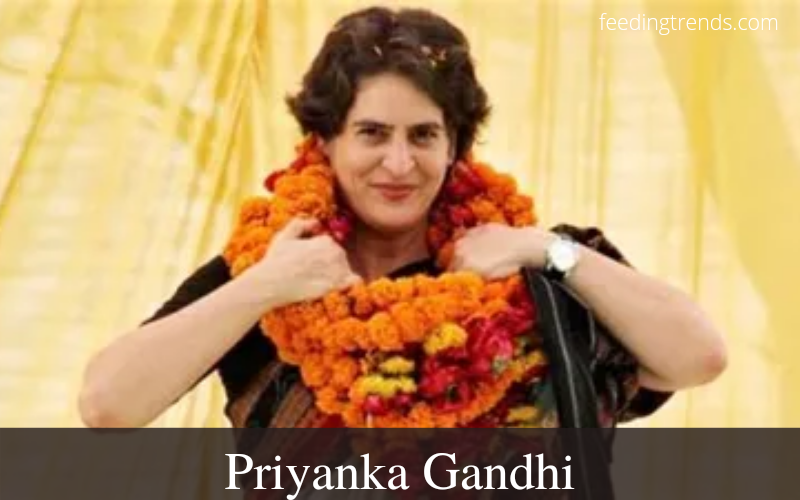
Priyanka Gandhi Vadra was born in New Delhi on January 12, 1972. She is one of the political leaders of India who belongs to Gandhi family. She is Sonia and Rajiv Gandhi's daughter. She obtained her psychology degree. Priyanka is a member of the Indian National Congress, however, she only became politically involved in January 2019. She oversaw her mother's campaign in the 2004 Uttar Pradesh assembly elections. She was chosen to represent eastern Uttar Pradesh as the INC's general secretary. She stated, "I am very clear in my mind, politics is not a big draw, and I can do things for people without being in politics," in an interview with the BBC in 1990. Despite her claims to the contrary, she entered politics on January 23, 2019, taking over as the Congress party's general secretary for the eastern area of Uttar Pradesh.
Every successful nation has a few key players who have contributed significantly to its growth. These are none other than the leaders who set the route for development. India is one of the fortunate countries to have seen some of the best political figures. They lived their entire lives working for the good of the country. These are but a few. Numerous other political leaders of India also work to advance their nation.
Appreciate the creator